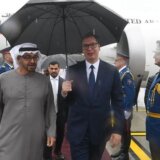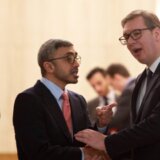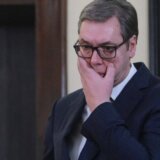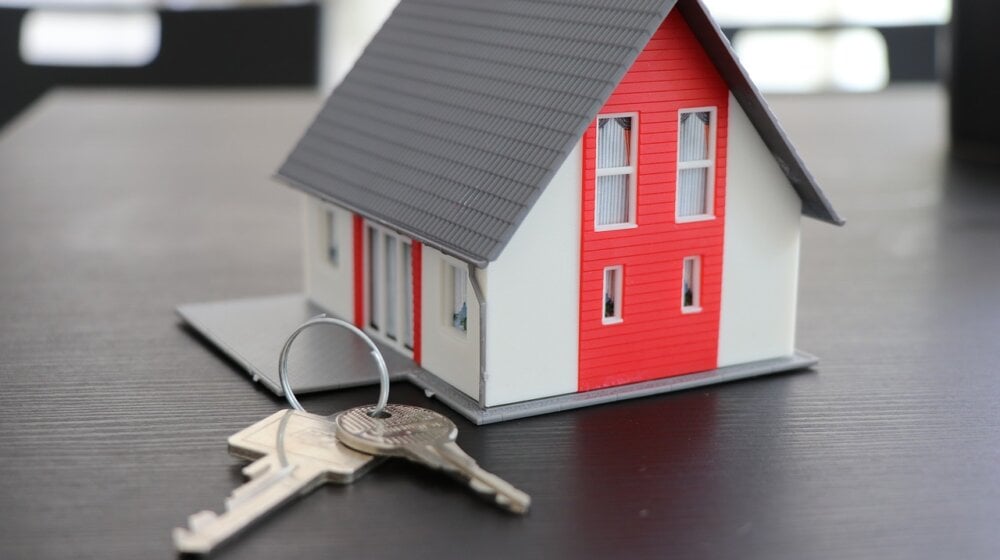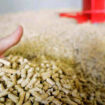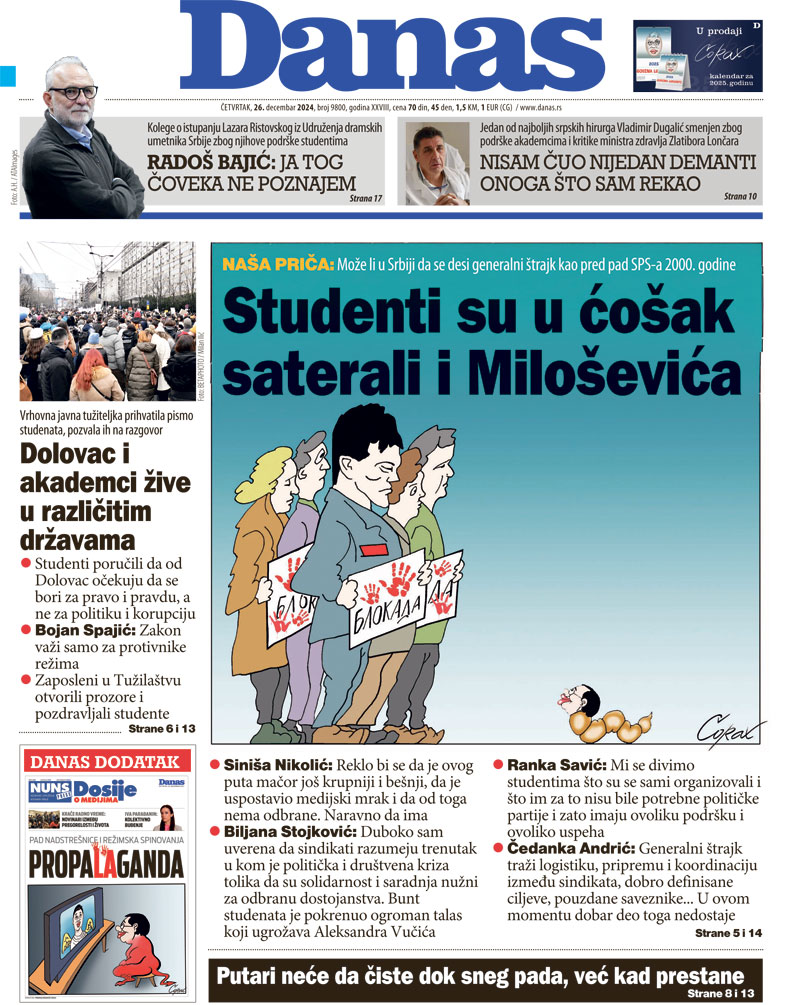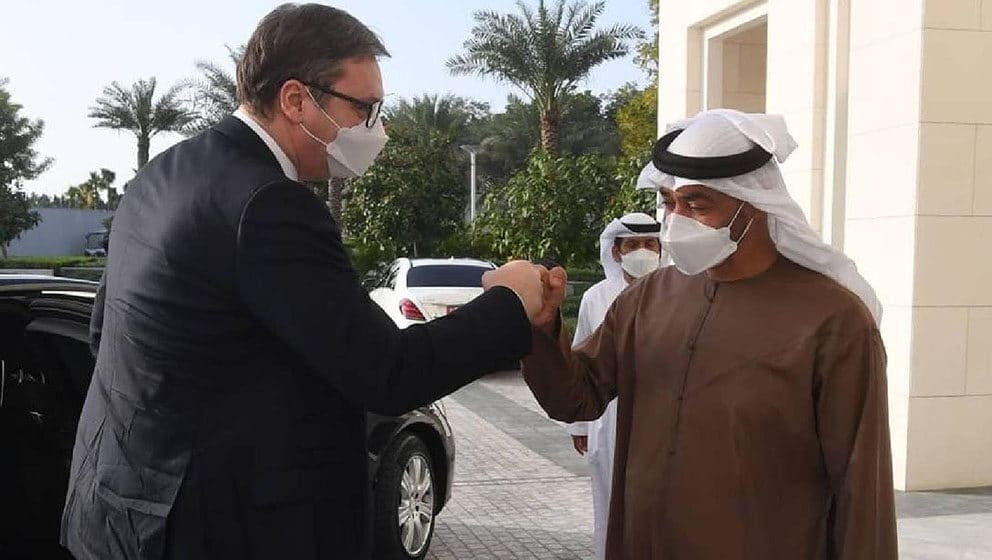 Foto: FoNet/ Instagram predsednika Srbije
Foto: FoNet/ Instagram predsednika SrbijeIma nekoliko godina kako se više ne pominju sa prvobitnim žarom “poslovi veka” koje je država sklapala sa firmama iz Ujedinjneih Arapskih Emirata.
For English version, please scroll down
Već dugo, ugašena je i nada kod onih koji su poverovali da će iz partnerstva sa tom zemljom Srbija u roku od nekoliko godina postati vodeća sila u poljoprivredi, vazdušnom saobraćaju, razvoju nekretnina, trgovini oružjem i savremenim tehnologijama proizvodnje čipova.
Teško je reći i koliko je to koštalo zemlju, kakva je korist proistekla iz (ne)povoljnih kredita, ustupaka ili navodno zajedničkih investicija u kojima je državnu kesu drešila uglavnom Srbija.
Informacije o detaljima iz poslova sa UAE spadaju u državnu tajnu iako je reč o javnim finansijama koje ulažemo mi i privatnom kapitalu koji je sa druge strane.
Sve je krenulo nakon dogovora s početka 2013. sačinjenog u senci privatnih odaja šeika Muhameda Bin Zajeda u Dubaiu sa svega nekolicinom državnih zvaničnika Srbije koje je predvodio Aleksandar Vučić, tada prvi potpredsednik Vlade.
Ubrzo je sporazum dobio oznaku “međudržavni”, ratifikovala ga je Skupština svega dva meseca kasnije. Time su svi poslovi sa UAE izuzeti su iz pravnog sistema Srbije, podaci koji bi po svojoj prirodi morali da budu javni, dobili su status tajnih i jednostavno se ne objavljuju a pitanja novinara institucije igniorišu.
Najistaknutiji domaći i strani pravni stručnjaci taj dokument ocenili su kao neustavan a uz to je i za sve poslove sa firmama ili institucijama UAE omogućio privilegovan položaj, skriven od javnosti.
Od tada pa u narednih godinu i po dana, Srbiju je zapljusnuo veliki talas najava i obećanja koja su se zgodno plasirala upravo pred izbore 2014. na kojima su naprednjaci osvojili pobedu.
Najpre je, kao potvrdu prijateljstva, poseta šeika Bin Zajeda Beogradu, predstavljena kao svojevrstan spektakl, rezultirala jednim “malim” minusom u državnoj kasi – kako se gostu iz Emirata dopao Kopaonik, vlast je odlučila da mu za 1,5 miliona evra proda hotel na toj planini koji je prethodno otkupila iz stečajne mase Jugobankle za 2,1 miliona evra.
Očekivalo se da će već naredne godine, kada je do temelja srušen, na tom mestu da nikne luksuzno rezidencijalno zdanje, ali je umesto toga, tek prošle godine završen hotel visoke klase, nakon spekulacija da se Bin Zajed povukao iz tog vlasništva.
Obejktom kao operater upravlja ugostiteljski lanac Viceroy u partnerstvu sa domaćom investicionom kompanijom Kopaonik Property Investments i Rojal Grupom iz Emirata. Ko je stvarni vlasnik ne zna se.
Uspon i pad domaće aviokompanije
Gotovo paralelno, široko je najavljeno spasonosno rešenje za posustalu nacionalnu avio kompaniju Jat Evrejz. Etihad, osnovan sedam godina ranije i sa skromnim učešćem u aviosaobraćaju tog regiona želeo je da popravi svoju poziciju okupljanjem pod okrilje više malih evriopskih kompanija.
Šema za Jat izgledala je ovako: kreditom od 40 miliona dolara Etihad je “platio” “ulaznicu” koju je kasnije konvertovao u svoj udeo od 49 odsto nove firme, Er Srbije.
Država je za preostale udele odmah uplatila 90 miliona dolara, ali uz obavezu da namiri prethodne dugove Jata od 237,7 miliona dolara kao i da u naredne tri godine obezbedi još 326 miliona kao pomoć za uspešan prodor nove kompanije na međunarodno tržište.
Menadžemt je imenovao Etihad a plaćala Vlada bez uticaja na odluke koje se donose. Danas, Etihad se praktično povukao, država je za dodatnih 100 miliona evra otkupila 31 odsto vlasništva, ali kompaniju opterećuju nepovoljni krediti uzeti od arapskog partnera, izgubljene tržišne pozicije i neizvesna sudbina.
U tom naletu poslova sa UAE, Srbija je sa firmom Al Ravafed potpisala sporazum kojim je osnovana zajednička kompanija koja je raspolagala sa više od 10.000 hektara vojvođanskih oranica.
Arapi su imali udeo od 80 odsto a udeo države od 20 odsto trebalo je da obezbedi da se profit u istom procentu uplati Vojnoj ustanovi Morović u čijem je sastavu bilo elitno Titovo lovište i ergela Karađorđevo.
Na dobit se računalo jer je obaveza partnera bila da uloži 115 miliona evra u navodnjavanje parcela, ali niti su se kanali izgradili niti je ostvarena dobit.
Ugovor sa Al ravafedom izazvao je gnev okolnih ratara koji su zemljište iz tog kompleksa ranije mogli da iznajmljuju za oko 450 evra po hektaru, dok je firmi iz Emirata ono ustupljeno po ceni od 250 evra.
I pored toga, u poslednje četiri godine Al Rafaved je u debelom minusu, samo prošle godine on je iznosio 63,9 miliona dinara, a 2019. bio je veći od 268 miliona dinara. Da li se profit, koji nije ostvaren, uplaćuje VU Morović ili je primenjen neki drugi oblik ulaganja, ne zna se jer odgovori na pitanja novinara ne stižu.
Afere i probijeni rokovi
Najgrandiozniji i najskuplji, još uvek aktivan projekat je izgradnja Beograda na vodi, koji prate brojne kritike stručnjaka, probijeni rokovi i afera “savamala” kojom su potpuno suspendovane domaće institucije a građanima uskraćeno pravo na zaštitu.
Način na koji je izbegnuto da se sankcioniše noćno rušenje kuća u tom naselju zbog potrebe stranog investitora, ljudi u fantomkama koji maltretirali građane i policija koja se oglušila o pozive u pomoć – početak su potpunog urušavanja države.
Uz to, buduća najviša zgrada u prestonici, „Kula Beograd“, koja niče poslednje tri godine na obali Save u „Beogradu na vodi“ je kao i ceo kompleks probila nekoliko rokova – najpre ju je kao glavni deo arapsko-srpske bajke na savskoj obali u junu 2014. najavio predsednik države Aleksandar Vučić.
Tvrdio je da će biti završena za dve i po godine, ali nije, kao što ni veliki tržni centar BW Galerija još uvek nije u potpunosti otvorila vrata kupcima iako je to trebalo da se desi pre dve godine.
Ali, još bolnija tema od “sitnih prekoračenja” je to što se nikakva računica ne dostavalja građanima – koliko je gradskog zemljišta praktično poklonjeno stranom investitoru, na koji je način strateški partner dobio 68 odsto vlasništva u zajedničkom preduzeću Belgrade Waterfon, koliko je koja strana uložila.
Ne zna se ni ko je odredio cene po kojima to preduzeće radi prateću infrastrukturu kao kompenzaciju za plaćanje gradskih dažbina.
Priča o arapskim investicijama u Srbiji ne bi bila potpuna bez bajke o fabrici čipova i avionskih komponenti u kojoj je glavna junakinja kompanija Mubadala.
Najavljena je na početku saradnje, još oktobra 2013. kada je Vučić, tada još kao PPV, tvrdio da će “do polovine 2014. biti otvorena velika fabrika aviokomponenti u Pančevu, a u roku od dve godine i fabrika čipova u koju će biti uložne desetine miliona evra”.
Tvrdilo se i da će Mubadala prvo uložiti nekoliko stotina miliona dolara u izgradnju centra za istraživanje i razvoj gde bi zaposlili 50 doktora nauka i oko hiljadu inženjera, potom se čak najavljivalo ulaganje od četiri milijarde evra za fabriku čipova. Međutim, posle izbora euforija je malo splasnula, otprilike na “ako ispunjavamo uslove”, da bi se potom priča potpuno zaustavila. Razvoj nano tehnologija u Srbiji sa arapskim partnerima, više niko nije pominjao.
Manje vidljivi poslovi
Uz sve te poslove, saradnja sa Emiratima imala je još dva važna koloseka. Jedan su krediti koje je država uzela za spašavanje srpskih javnih finansija, i to još na početku uspostavljanja prijateljskih poslovnih poduhvata, kada je tvrdila da će dobiti pod povoljnim uslovima tri milijarde dolara.
Prvu milijardu Vučić je sa Bin Zajedom ugovorio početkom 2014. a domaćoj javnosti je to predsatavljeno kao “kredit po najpovoljnijim uslovima koje je zemlja ikad dobila”.
Objasnio je da će deo te prve tranše rasteretiti nivo javnog duga a ostatak bi se upotrebio za podsticaje privredi.
Novac je uzet na period od 10 godina, nakon čega dospeva u celosti, dakle za tri godine, fiksna kamatna stopa je dva odsto i ona se plaća polugodišnje, što je rata od po 10 miliona dolara na svakih šest meseci. Zatezna kamatna stopa u slučaju kašnjenja sa otplatom iznosila je tri odsto.
Kako su analitičari kasnije ocenili, to je bila ulaznica za arapski kapital u Srbiju, u projektima koji su se po pravilu odvijali bez tendera, netransparentno.
Nova pozajmica, druga milijarda povučena je dve godine kasnije ali su uslovi bili manje povoljni zbog čega je Vučić morao kritičare da nazove „nepismenima“, jer „samo takvi kritikuju odluku o zajmu“, u šta je uračunao i neke članove Vlade.
Srbija se, uz to, zadužila i kod Fonda za vrazvoj Abu Dabija za oko 100 miliona evra koje je trebalo upotrebiti za izgradnju sistema navodnjavanja u 13 poljoprivrednih dobara. Međutim, projekti za taj posao nisu bili izrađeni, pa je privi novac povučen tek 2017.
I dok su pozajmice i partnerstva bili naša unutrašnja priča o saradnji sa arapskim institucijama i kompanijama, trgovina oružjem koja je započela još 2011. a razbuktala se dve godine kasnije, često je bila na meti međunarodne javnosti i medija.
Spekulisalo se i da su UAE uslovljavali investicije u Srbiji potpisivanjem ugovora o izvozu oružja, ali ima i obrnutih mišljenja, da je pravi obim transakcija sa oružjem bio zamaskiran drugim ulaganjima.
Činjenica je da su ugovori i o tim poslovima obavijeni velom tajne, u detalje ne mogu da proniknu ni stručnjaci ali ipak tvrde da je ta vrsta saradnje Srbije sa UAE loša za naš imidž jer je reč o partneru koji ulčestvuje u vojnim konfliktima u svom okruženju.
Tokom godina, česte su bile sumnje stranih medija da su upravo preko arapskog sveta srpska vojna oprema i oružje došli do tržišta za koje je vladala zabrana isporuka, čak i do ekstremističkih grupa.
Sadržaj je rezultat istraživanja sprovedenog u okviru projekta „Transparentnost učešća države u stranim investicionim projektima“. Stavovi izneti u tekstu su stavovi autora i ne izražavaju nužno stavove donatora.
ENGLISH VERSION
What is the real effect of the euphorically announced deals with the United Arab Emirates?
From a Nanotechnology Fairy Tale to the Hidden Paths of Serbian Weapons Sales
For several years now, “the business deals of the century”, made by the state with the United Arab Emirates companies, have not been mentioned with the original zeal.
It has been a long time, too, since those, who believed that the partnership with this Arab country would, within a few years, make Serbia the leading power in agriculture, air transport, real estate development, arms trade, modern nanotechnologies, and microchip production, lost all hope.
It is also difficult to say how much it has cost our country, what benefit we have had from the (un)favorable loans, concessions or alleged joint investments, based on the Serbian taxpayers money, which has been generously pumped into them.
All information about the details of the dealings with the UAE has been classified as a state secret, although it is the public finances that we invest into these projects, whereas the UAE side invests private capital.
It all started in the beginning of 2013, in the shadows of the private chambers of Sheikh Mohammed Bin Zayed in Dubai, when an informal agreement was made by a small group of Serbian state officials, led by the then First Deputy Prime Minister Aleksandar Vučić.
The agreement was soon labeled „interstate“ and ratified by the Assembly only two months later.
Thus, all business deals with the UAE have been excluded from the legal system of Serbia, the data, which, by their nature, should be public, have been classified as secret and have been kept hidden from the public, and all questions in this regard that journalists have addressed the institutions with have been blatantly ignored.
The most prominent domestic and foreign legal experts assessed the aforementioned document as unconstitutional, as it provided a privileged position, hidden from the public, to all business dealings with the UAE companies or institutions.
From that point on, for a year and a half, Serbia was overflooded by a tsunami of announcements and promises, which were conveniently marketed just before the 2014 elections, eventually won by the Serbian Progressive Party.
First, as a token of friendship, Sheikh Bin Zayed’s visit to Belgrade, presented as a spectacle, resulted in a „small“ deficit in the state coffers – since the high level guest from the Emirates liked Kopaonik, the government decided to sell him a hotel on this mountain for 1.5 million euros, which it had previously bought from the creditors of the bankrupt Jugobanka for 2.1 million euros.
It was announced that the old hotel would be torn down the following year so that a luxury residence would be built on the site. Instead, six years later, a high-class hotel was completed last year, after speculations that Bin Zayed had withdrawn from the ownership.
The facility is operated by the Viceroy hospitality chain in partnership with the domestic investment company Kopaonik Property Investments and the Royal Group from the Emirates. It is not known who the real owner is.
Rise and fall of the national flag carrier
Almost simultaneously, a life-saving solution for the declining national airline Jat Airways was widely announced. Etihad, an UAE airline founded only seven years earlier, which had a modest share in the air traffic market in this part of the world, wanted to improve its market position by acquisition of a number of smaller European companies.
The scheme for JAT looked like this: with a $ 40 million loan, Etihad „paid“ for an „entry ticket“, which they later converted into their share of 49% of the new company, Air Serbia.
The state immediately paid 90 million dollars for the remaining shares, with the obligation to settle JAT’s previous debts of 237.7 million dollars, as well as to provide another 326 million in the next three years to help the new company successfully penetrate the international market.
The management was appointed exclusively by the Etihad, although it was paid by the Serbian Government, which had no influence whatsoever on the decisions the Etihad management made.
Today, Etihad has practically withdrawn, as the state bought 31 percent of the Etihad ownership for an additional 100 million euros, but the company has remained burdened by unfavorable loans taken from its UAE partner, it has lost market position and is facing an uncertain fate.
In the rush of business deals with the UAE, Serbia also signed an agreement with the company Al Rawafed, and established a joint company with more than 10,000 hectares of arable land in Vojvodina.
The UAE partner had a share of 80 percent, whereas the state’s 20 percent share was supposed to ensure that the percentage of the profit paid to the Morović Military Institution, which included the elite Tito’s hunting ground and Karadjordjevo stables, has remained on the level necessary for the Morović’s unimpeded operations.
The profit calculations were made based on the the UAE company’s obligation to invest 115 million euros in the irrigation system, but the irrigation system was not built nor was the profit made.
The contract with Al Rawafed provoked the anger of the farmers living in the area, who used to rent the farming land from the Morović complex for around 450 euros per hectare, while the company from the Emirates was given it for 250 euros.
Despite that, in the last four years, Al Rafawed has had a big deficit, which amounted to 63.9 million dinars in 2020, while in 2019 it was higher than 268 million dinars. It is not known whether the obligatory percentage of the profit – which has not been made since the contract with Al Rawafed was signed – has been paid to the Military Institution Morović at all or some other form of investment has been used instead, since the parties involved have remained silent and failed to provide any answers to repeated journalist’s questions in this regard.
Scandals and unmet deadlines
The most grandiose and the most expensive deal is the ongoing Belgrade Waterfront development project, which is marked by extensive expert criticism, unmet deadlines, and the „Savamala“ scandal that completely suspended domestic institutions and denied citizens the right to protection.
The way the state institutions avoided to sanction the illegal night demolition of houses in the Savamala neighborhood to satisfy the needs of a foreign investor, the group of thugs wearing ski masks who carried out this demolition and harassed and terrorized the people living and working in the Savamala, and the police who ignored calls for help – all this was the beginning of the complete collapse of the state.
In addition, both the construction of the future tallest building in the capital, the „Belgrade Tower“, which has been built on the Sava bank as a part of the „Belgrade Waterfront“ for the last three years, and the construction of the “Belgrade Waterfront” complex as a whole, have failed to meet several extended deadlines.
In June 2014, it was Aleksandar Vučić who announced the construction of the Belgrade Tower and said that it would be completed in two and a half years. Seven and a half years later, the tower is still far from being completed yet, just as the large shopping center BW Gallery has not yet fully opened its doors to customers, although it should have happened two years ago.
However, an even more painful topic than „small breaches of deadlines“ is that citizens have been totally deprived from any information on how much of the city land has been practically donated to the foreign investor, how the strategic partner acquired 68 percent ownership in the Belgrade Waterfront joint venture, and how much each party has invested in the project.
Furthermore, it is unknown who has determined the cost of the development of the supporting infrastructure, which is the company’s compensation instead of payment of the due city taxes.
The story of the UAE investments in Serbia would not be complete without a fairy tale about microchip and aircraft components factories starring the Mubadala company.
These investments were announced at the beginning of the cooperation, back in October 2013, when Vučić, the then first deputy prime minister, claimed that „by mid-2014, a large aircraft components factory will be opened in Pančevo, and, within two years, a microchip factory, too, in which tens of millions of euros will be invested”.
It was claimed that Mubadala would first invest several hundred million dollars in the construction of a research and development center, which would create jobs for 50 doctors of science and about a thousand engineers, with a follow up investment of four billion euros in the microchip factory.
However, after the elections, the euphoria subsided a bit, roughly to „if we meet the conditions“, and then the story faded out completely. There has been no mention of the development of nanotechnologies in Serbia in cooperation with the UAE partners since.
Less visible deals
In addition to the aforementioned deals, the cooperation with the Emirates had two other important tracks. One track comprises of the loans that the state took to save Serbian public finances at the very beginning of the friendly business ventures, when it claimed that it would receive three billion dollars under favorable conditions.
The first billion that Vučić contracted with Bin Zayed at the beginning of 2014 was presented to the domestic public as „a loan under the most favorable conditions that the country has ever received“.
He explained that a part of that first tranche would relieve the level of public debt, and the rest would be used to stimulate the economy. The money was taken for a period of 10 years, after which it matures in full, which will happen in three years from now.
The fixed interest rate is two percent, and it is paid semi-annually, in 10 million dollars installments every six months. The default interest rate in case of late repayment is three percent. As analysts later assessed, it was a ticket for Arab capital to Serbia, in projects that, as a rule, took place without a tender and in a completely non-transparent way.
The new loan, also in the amount of one billion dollars, was withdrawn two years later, but the conditions were less favorable. Vučić labeled the critics of the conditions of the new loan as „illiterate“, because „only illiterate people criticize the decision on the loan“, although critics included some members of the Government, too.
In addition, Serbia borrowed about 100 million euros from the Abu Dhabi Development Fund, which was to be used to build an irrigation system for 13 agricultural properties. However, as it took several years to complete the relevant project documentation, the first tranche of this loan was withdrawn in 2017.
While the aforementioned loans and joint ventures with the UAE institutions and companies have been predominantly in the focus of attention of the Serbian public only, the arms trade, which began in 2011 and flared up two years later, has often been targeted by the international public and the media.
It was also speculated that the UAE had conditioned investments in Serbia by signing an agreement on arms exports, but there are also opposite opinions that the true volume of arms sale transactions was masked by other investments.
The fact is that the agreements on these deals are shrouded in secrecy and that experts cannot penetrate into the details, although they still insist that this type of cooperation between Serbia and the UAE is harmful for our image because of the UAE involvement in military conflicts in its environment.
Over the years, there have been frequent suspicions by foreign media that it was through the Arab countries that Serbian military equipment and weapons ended up in the conflict zones, violating the active UN arms embargos, and that they are even used by extremist groups in these areas.
The content is the result of the research carried out within the project „Transparency of State Participation in Foreign Investment Projects“. The views expressed in the text are those of the authors and do not necessarily reflect the views of the donor.
Pratite nas na našoj Facebook i Instagram stranici, ali i na X nalogu. Pretplatite se na PDF izdanje lista Danas.

